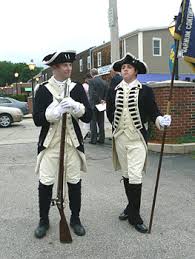|
Gamer Forge Listener Email: Name Calvin Garcia Comment In the D&D group I play with one of the players insists that when you reach a new level you have to zero your experience. However when I checked the PHB1 there is no reference to this. PHB1 uses the term Total Experience when talking about leveling up. Which is correct? Gamer Forge Response: Say, whaaaat? DCR says: No. no, & no. Your friend is either severely misinformed, or feeding you a line. Experience points (XP), is a progressive jackpot. It would take forever to gain levels if your XP total reset each time you "ding". Hence the term, "grinding". Gamer Forge Listener Email:
Name Steven Cowan Comment When in Ravenloft, would the town in question know that the Dark Lord is indeed, say, a vampire? That he or she would be the real ruler of that Domain? For example: Barovia. Strahd has been there for a long, long, very long time. How do the villagers see him? Simply an undying ruler (if a ruler at all)? For what he is, a powerful vampire? The real ruler of Barovia? His castle… simply a haunted castle that's been there since the beginning of Barovia? Or that the Castle Ravenloft is the home of the Vampire Dark Lord? I guess it could vary from DM to DM, but I have always wondered how would you explain it. Are the people in each domain in denial, would they know by now, etc.? Gamer Forge Response: We have no witty segue into this one. DCR says: 1. What's the alternative? Maybe the citizens put up with a vampire lord because the surrounding area is at least ten times worse than in the domain of the castle. You head into the surrounding countryside and you are threatened with death all day, every day. While the land around the castle is, at the very least, protected. Thus, the villagers put up with the occasional abduction/sacrifice. 2. Again, the alternative: maybe the villagers are totally okay with their undead ruler. Maybe the town sees the need to give up one of the town's virgins to ensure the safety of the rest of the population. Who knows? Maybe the vampire offers excellent health insurance and a 401k. So where does this leave the heroes? This idea might be best left for when you're ready to throw a curve ball at your players. 3. The easiest thing to take into account would be time frame. What point on the timeline will your heroes be making their appearance. If they are early in the canon, then maybe the villagers don't know for sure what rules Castle Ravenloft. Later on, you can easily justify the townsfolk knowing more about what goes on up there. Your heroes might not be the first heroes to show up... Gamer Forge Listener Email: Name School Teacher [email protected] Comment Dear Dungeon Crawlers Radio, I work with students that have a lot of difficulty performing roles that benefit the group as a whole. Their mentality is that they all want to be the winner or at least play the most important part, and so they struggle with the fact that everyone is important and plays a role in success for the group. I am asking here because my knowledge of any kind of RPG where roles are assigned and must be performed is extremely limited. Any help would be greatly appreciated. I have 10 year-olds, usually 8-10 of them. Fantasy is fine, but probably need to stay away from demons and black magic. My initial thought that started this was an economy type rpg. What I'm really looking for is a game where the students are required to perform a role that differs from everyone else's, and if they don't perform it well (as in trying to do someone elses "job") they fail as a group. Thank you, Gamer Forge Response: Hmmmmm....DCR says: 1. Try splitting the class into groups of no more than four, then give each group a choice of character to which the group decides actions. Then, the whole class becomes a controlling interest in the party, and every important decision is made by the class and success/failure rests on the students. Pre-generated characters will most likely serve you best, but at least consider letting the groups generate a character. That way they make more decisions regarding the outcome. No, seriously. Use the link above. It's free and saves you a bunch of time. 2. This isn't tee-ball! If you enter with the mentality that failure cannot happen, for whatever reason, then you are depriving your student of the most important life lessons. Namely, coping with failure. Ideally, the students will succeed and the adventure continues. We say, make a big deal about the big decisions, and if the "character" doesn't quite succeed, make it light hearted, move on quickly, and bring the focus back to the story, not on the failure. Trust us, the students will feel it, and internalize those feelings. But they must learn to cope with the failure, not just success. 3. Don't get too mundane. Its a good opportunity to incorporate lessons on economy and the barter system. Just remember not to let mundane events become the focal point of the game. *Bonus XP: If you need a more educational reference about antagonists and how they rule, remember that during the American Revolution (you know, the one that made the United States of America), good people still supported England, even though they colonists hated being taxed like they were. Not necessarily out of loyalty, but because England was still trying to take care of it's colonies. Sure, it wasn't exactly a bang-up job, but what do you expect from an Empire that was growing too large to manage.
0 Comments
Gamer Forge Listener Email: Name Sam Workman Comment Is it possible to hit an incorporeal creature with a spell that requires a melee touch attack without the use of any magical ability that allows one to make contact with incorporeal beings? Put another way, does using a melee touch attack spell grant the innate ability to hit incorporeal beings with it? The most typical example would be the use of a Cure Spell, or potentially the Lay on Hands supernatural ability, as used on incorporeal undead such as Shadows or Banshees (Undead and Incorporeal tend to go together more than any other monster type, and all undead, physical or otherwise are harmed by healing magic). Would attempting to cast a healing spell on such a creature using only your bare hands be possible? I see three possible interpretation, with two possible answers: 1) Yes, because a magic spell is being used, and all magic grants the innate ability to bypass incorporeal creatures as per its definition. 2) No, because in order deliver a spell as a melee touch attack, one must first make the touch attack, which is impossible on such a creature. The magical nature of the attack does not come into play until after the mundane contact is made. 3) Yes, because even though #2 is true, one can release the spell simply in the general vicinity of the creature (such as sticking one's hand through them and releasing it inside them) without having to strictly feel the target. The only reason this comes up is because I am concerned that the second one is correct - that such an attack is impossible because delivering such a touch attack does not count as magical until after it hits, which it never will. Gamer Forge Response: Intangibility, or tangibility? That is the question. But DCR says the answers are: 1. Incorporeal creatures are a nasty little cheat to beat magic and spells. Almost on a Turbo Tunnel level to make a creature impossible to beat. Our argument for saying that incorporeal creatures can NOT be magic-ed up would be along the lines of "you can't touch it on the shoulder, you can't deliver a touch attack." Your hands pass through the being, so touch attacks are impossible. 2. However, the flip side of the coin would be more "meta". If the being is to be considered on the material plane (or whatever plane of existence you might be on), it must have a tiny bit of tangibility, and have at least some small chance of touching it. Otherwise, how does it interact with anything? You can quantify this by giving the creature in question the bonuses to defense similar to being blind or fighting in the dark, or complete cover. The odds are very against the heroes, but the chance is still there. 3. The cool part: this opens the door to make heroes question their reality and sanity. Use this scenario sparingly. If all the enemies they face are incorporeal, then it becomes mundane and/or impossible to deal with, and you lose their interest. But once in a great while, pull out the see-thru stuff to mess with their mind. Gamer Forge Listener Email: Name Henry Stevenson Comment Can demon lords read minds in D&D 4th edition? If they cannot, would it be a stretch to say Graz'zt (a demon lord I'm depending on heavily in my campaign) can perform this feat? Gamer Forge Response: Demonic presence? You can totally handle it! When it comes to the leaders of the damned, DCR says: Sure. There's no reason they can't. Do your players know enough to question your authority? That's a trick question. It doesn't matter. If you think your demon villain would be better with telepathy, then go for it. Gamer Forge Listener Email:
Name Robert Cole Comment Does a weapon thrown with Giantkind Gloves gain weapon benefits? Giantkind Gloves possess the following power: Power (Standard Action) Strength + 2 vs. AC; ranged 6/12; you throw an object 30 lb. or less; 2d6 + Strength modifier damage. Level 14: Strength + 4 vs. AC; ranged 8/16; 50 lb. or less; 2d8 + Strength modifier damage. Level 24: Strength + 6 vs. AC; ranged 10/20; 80 lb. or less; 2d12 + Strength modifier damage. Since no standard weapon weighs over 30 lb., every weapon would be eligible for throwing using this power. When throwing a weapon with this power, does this attack benefit from other bonuses? Essentially, the questions that I think need to be answered are: •Does throwing a weapon with this power count as making an attack with that weapon? (e.g. weapon properties, magic weapon) •Is this considered "throwing a weapon" for the sake of counting as a thrown weapon attack? (e.g. class features, other passives) References The following examples are provided as a reference for what I am asking about. Weapon Proficiency This seems pretty straightforward but worth mentioning. Since the attack does not list the Weapon keyword, I do not believe it can benefit from weapon proficiency bonuses: Proficiency Bonus: Gained from proficiency with a weapon, this bonus applies to attack rolls with that weapon. An adventurer gains the proficiency bonus only when wielding the weapon and using powers that have the weapon keyword. Class Features The Seeker's Spiritbond class feature grants two different bonuses to thrown weapon attacks: You also gain a +1 bonus to attack rolls with both light thrown and heavy thrown weapons, and when you make an attack by throwing a weapon with which you have proficiency, the weapon returns to your hand after the attack. Magic Weapon Returning Would throwing a magic weapon with these gauntlets benefit from the rule that states magic weapons return? The power says ranged 6/12, which I am guessing makes it a Ranged attack- otherwise one would argue it does not provoke opportunity attacks. Any magic light thrown or heavy thrown weapon, from the lowly +1 Dagger to the +6 Dragonslayer Javelin automatically returns to the wielder's hand after a Ranged Attack with the weapon is resolved. Magic Weapon Properties For example, when throwing a Weapon of Long Range, which has the following properties: This weapon’s long range increases by 10 squares. You do not take the penalty to attack rolls for attacking at long range with this weapon. It seems the power would not benefit from the first property, but might with the second. Feats •Power Throw allows you to deal extra damage for a -2 penalty to attack rolls when making a "ranged attack with a heavy thrown weapon". •Arcing Throw: "When you use a spear as a thrown weapon, the target doesn’t gain cover from its allies." •Brutal Bludgeon: "When you hit with a club or a mace ... Reroll any damage die result of 1 until the die shows 2 or higher." Other Passives What about other passives, such as the one found on Dwarven Throwers? Gamer Forge Response: We asked for more specific, and we got it. DCR says: 1. Revan and Flagoon say yes, because it's a thrown weapon, provided you are proficient with the weapon being thrown. However... 2. Guy Named Joe believes that he is always correct. His logic is flawless. He says, "no", because when using a magic item to make an attack, the bonus for the attack are generated from the glove, not the weapon. The item being thrown is a random, non-specific item, like a dumbbell or a kettle, and not the character's specific items. Your proof is right here. *Bonus XP: For even more references to awesome demons and telepathy, check out the movie Scanners here and the movie Legend here. Both are old movies, but are totally in line with the sorts of themes involved in a fantasy epic. Yes, even Scanners, believe it or not. You gotta demonstrate just how awful a power like telepathy can be when in the hands of evil, right? DCR Gamer Forge Listener Email:
Name: Megan Comments: Okay this may sound strange coming from a woman. However in my pathfinder game that I play in I am wanting to transition my rouge character to an assassin. The guys are giving me crap about it because they don't believe I could play that type of character because up until this point my character has mainly just been a pick pocket and show no tendacies for violence. My DM is asking for a legit reason for the change. I am struggling here because I really want to make this leap with my character. background on my character she is a half elf woman who's elven mother was raped and then left for dead. Some clerics found her and was able to keep her alive but barely. During child birth she passed on. I grew up under the watchful eye of the clerics and was really pushed around for because of it. When I turned 16 one of the clerics tried to force himself upon me and in my desperate moment I stabbed him with a dagger I happened upon. The clerics sided with their brother and threw me out. I sturggled to live but found that I had a knack for pilfering things and eventually became very good at it but never stealling more than I needed or from those that had less than I. Then there was an event that forced me into this group of adventures that I am now with. Namely I was caught stealing from a local lord and forced into servitude to this group so that I can be free of my crime. The group has come to rely upon my skills. So can you help me justify a legitimate change? And how I can do it? Thank you megan! DCR Gamer Forge Response: When taking on the unfortunate (and awesome) role of an assassin, DCR says: 1. Find and connect an emotional response. She's already given a good reason to want to kill someone, or at least a justifiable one. It's as simple as illiciting something mercurial, even primal, about wanting to kill. Tap into the very core emotions in your backstory. Inigo Montoya from The Princess Bride is a classic example. He is good at killing, but for the singular purpose of revenge. Once you've got your GM/DM/Referee/Storyteller/Watcher/Whatever bought into your reason, obtaining the class of your choice is as good as done. 2. Responsibility vs. Enthusiasm. Some famous characters actually like killing. Others see it as a way to make a living. Both have this in common: they're good at it. Make sure you define this when advancing your character through the levels. This is a great roleplay opportunity for you and your group. Is it something your character sees as just a job, but feels bad about doing? Is he/she finding that killing is far more intriguing than the whole "letting people live" thing. This is character development gold. 3. This is only a definition of a talent or skill, not necessarily a chosen profession. Some people, regardless of chosen profession, possess skills in other areas. So taking a class, any class, is only a description of heightened training or talent. Characters may have ten levels of "bard", but the actual method of earning that sweet "dollah-dollah" are literally myriad. Conan the Barbarian was very good at killing people, but made money by theft. Sam and Dean Winchester are good at killing demons, but make their money by scams and pool hustling. Remember this when assigning trained skills or skill points or the like. *To go the extra mile, watch episodes of The Equalizer. A tv series from the late 80's about a mercenary who had the tragic knack of killing lots and lots of bad people. A recurring theme of the show examines the emotional cost of killing bad guys. Also, Artemis Antreri from the Legend of Drizzt novels is excellent for examining interest in killing others for money and embracing that skill to a fault. DCR Gamer Forge Listener Email:
Name: The Wizard Comments: Okay I am creating my campaign and I am wondering what do you think is more fearful and a better big boss villain. a) Dragon b) Demon c) Evil Wizard d) Demi God e) Magical creature And why? Gamer Forge and the Playing group know as "The Corner" Response: The wizard wrote in a great question however you don't need a big dragon or a demon to terrorize the group. Sometimes the best villains are meager mortals you have grand designs of their own. Here are a few ideas for your villain creation. When it comes to a hive of scum and villainy, DCR says; 1. Personal attacks. Have it get real personal. Maybe your villain captured and tortured one of the heroes and left them with a hand full of broken fingers. Damage something they truly value, like reputations or family. Most importantly, SHOW IT HAPPENING! Go into detail. This shows just how personal it is. 2. Attack sideways. Make your heroes do something other than blunt force smashing and straightforward assaults. They'll have to re-think their strategies. Incite a civil war in the streets of their hometown. Send in a sleeper agent at the start of the game. But make like you're playing nice to them. Its part of the illusion; you're playing dirtier than you've ever played before. 3. Terror! Do something horrific, but only do it once. A cannibal only needs to be seen feeding once to have the reputation of a cannibal. Maybe the evil lord has a human shield of no less than 5 innocent children at all times. You only got to see that once to get the hint about the guy/girl. One time is all you need to establish just how low this being is willing to stoop to win/stay alive. This brings us back to making a villain they will want to defeat.  Gamer Forge Listener Email: Name: Anis Comments: Okay this is my first time submitting a question. I have heard you talk about other emails listeners have submitted so I figured why not try. I am putting together a new game and wanted to get your opinion. What are your thoughts on putting in a God as the antagonist of your game? Gamer Forge & Tracy Hickman Response: Oh, God! When it comes to making the deity a little crazy and villainous, Tracy Hickman and DCR say: 1. Don't. 2. Focus on other elements, like fun. Good storytelling will replace a powerful villain, anytime. Before the heroes are ready to take on the big challenges, they need to grow internally. Make 'em lose a few times so they can lick their wounds. Give them a romantic foil. Throw in a sprinkle of political intrigue. Maybe a rival adventuring group. All of these can add the necessary excitement to your game. Also, its important in building context. 3. No need to up the ante. To constantly raise the ante of your battles is to miss the point of conflict. The best of the best bad guys, as stated previously, are the ones that are right. Create a villain that the heroes will want to defeat. If you throw up a mountain of battle, it will be seen as only a mountain to climb to the next challenge. The mountain itself presents all the obstacles of the story, while reaching the top is part of the objective of the story. Brass ring, baby. In the words of Scrooge McDuck, "Work smarter, not harder." *To go the extra mile, Tracy recommends watching The Fifth Element, or Air Force One. Gary Oldman's performances in those movies are what a good bad guy is all about. Here are your experince points on the subject to help level up your game.
1. Think differently than your characters. Superman is good because of his morals. Lex Luthor is evil because of his. Take one or two aspects of your characters and skew it. Twist their ideas and warp them into a new, if not alien, set of morals. Make the players question their's. 2. Think BAD-ASS! Want to draw attention to your villains' villainy? Give them shinier toys. Give them bigger cars. Give them the girls/boys. Give them bigger hair. Make them transform into cooler things. Villains always get cooler clothes! Except for Batman and Gambit. 3. Think "street cred". Nobody wants to hear a giant backstory for an NPC. Don't waste your time with it. Let the villains' actions speak for themselves. Kill innocent villagers. Smash two planets together "just to see what happens". Push limits. Push buttons. But still give them a motivation. A driving force behind his/her actions. Players should have every reason to fear the moment they actually meet the head villain(s), let alone fight them. To really go the extra mile, strive to have a villain who can blur the lines of morality. Some good examples are Alonzo Harris in the film Training Day, played by Denzel Washington, and Ozymandius from the Watchmen comics and trade paperback. Both are good uses of your time. |
The GamerForge is DungeonCrawlersRadio’s most favoritist segment of the entire show. Have you ever had a boggling rules question that no one in the group can figure out? Write in to us and we’ll help try to solve it! Are you a Game/Dungeon Master who needs help squashing animosity at the table or dissension in the ranks? Perhaps we can help!
If you are in need of help, encouragement, or an uber devious way to get a TPK, we are here to help. No matter your needs, we’ll help you get more from your gaming! The Gamer ForgeWhere Players & Game Masters can come for valuable information to level up your game! Archives
August 2013
Categories
All
|





 RSS Feed
RSS Feed








